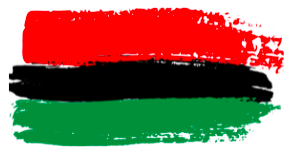 A Letter from Sylvia Spears on Juneteenth
A Letter from Sylvia Spears on Juneteenth
Dear Members of the Emerson Community,
This Friday, Emerson will observe Juneteenth as an official holiday for the first time in the College’s history. Although Juneteenth may be new to some members of the Emerson Community, observances in the form of gatherings, celebrations, musical events, and religious services have been taking place in African American communities for a very long time. Against the backdrop of what is now being described as a time of racial reckoning in the United States, Juneteenth has come more fully into the public’s awareness. States, cities, businesses, organizations, and a host of colleges and universities have added Juneteenth to their official holiday calendars. And, yes, that is a good thing.
Yet, I continue to think about all of the historical and present-day complexities surrounding the holiday, especially our understandings of what abolition might truly mean. Juneteenth recognizes the day that the Union Army freed the last group of people in the United States who remained enslaved for two years beyond Abraham Lincoln’s signing of the Emancipation Proclamation. Think about what it means that the U.S. government made slavery illegal in 1863 but it continued in Texas for two more years. What does that reveal about our reliance on government-granted rights to ascribe value to our humanity, especially if those rights can be given, ignored, or taken back? What does it mean to celebrate the abolition of slavery while many continue to fight for the fundamental promises of abolition? Further, how might we think about abolition beyond the release of iron shackles to the transformation of the consciousness that allowed slavery to happen and still permeates our society today?
These questions cause me to ponder what it means for Juneteenth to slowly become mainstream. This year, more companies than ever will observe Juneteenth—Best Buy, Ford Motor Company, General Motors, Google, J.C. Penny, J.P. Morgan, Master Card, the NFL, Nike, Target, Twitter, Workday, and many more. Is this a sign of growing commitment to racial justice? Just yesterday, the U.S. Senate unanimously passed a bill making Juneteenth a federal holiday. Are these groups and organizations committed to growing their anti-racist practices or is observance of Juneteenth a symbolic gesture driven by the politics of appearances and devoid of any effort to address the myriad of injustices that affect the lives and well-being of African American and Black communities? These are the questions that weigh on my heart as I also honor the ancestors who fought for freedom.
Today, I wonder how we, at Emerson, might meaningfully observe Juneteenth in light of the long arc of history in which “freedom is a constant struggle.” For me, Juneteenth cannot solely be a time for celebration. It must also serve as an act of resistance. It is my hope that we will all choose to reflect, to learn, and to act in ways that help us to realize true abolition and liberation for African American and Black communities, along with all other communities who are affected by oppression.
Juneteenth Resources: https://websites.emerson.edu/juneteenth-resources
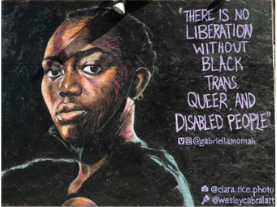
Deepening Our Disability Justice Practice
On April 6, Access: Student Disability Union, Emerson’s first affiliated student organization for disabled students, informed the Emerson Community of the Access Advocacy Project (linktr.ee/AccessSDU). In their materials, the group called upon the College “to do the hard, but important work of making itself more equitable to disabled students and community members.” In addition to sharing an Action Plan for Disability Equity as a starting point for change, Access: Student Disability Union noted that “…anti-ableism work requires a communal, continuous effort….” The staff of the Social Justice Center extend gratitude to Access: Student Disability Union for their call to our community to make the College more accessible and equitable for students and community members with disabilities.
We pledge to work with sincerity and sustained commitment to deepen our understanding of disability justice, to address instances of ableism within our practices and at Emerson, and to work toward true liberatory access for members of our community. To this end, the Social Justice Center had entered into a more in-depth study of disability justice and will be working to realign our practices accordingly. Please know that changes in our practices will be deliberately considered and a work in progress.
We invite the Emerson Community to join us in this important work. For resources related to Disability Justice, please visit the SJC’s Radical Guide for Social Justice at https://guides.library.emerson.edu/radical. The selected materials center the experiences and perspectives of people within the disability community.
“I want to say unequivocally that disabled people are everywhere. We are one of the largest oppressed groups on the planet. We are part of political movements, even if you don’t know or don’t acknowledge that we are. No matter what community you’re working with, you are working with disabled people. “ Mia Mingus – Longmore Lecture
https://longmoreinstitute.sfsu.edu/mia-mingus-longmore-lecture-video-now-available
_____

As part of the refinement of the College’s strategic goals in 2012, Emerson sought to increase its engagement in communities within the Boston area. At that time, a new center was created as an administrative hub for some of this work. This new center was named after Elma Lewis, an Emerson alumnae ’43, who was arts educator and the founder of the National Center of Afro-American Artists and The Elma Lewis School of Fine Arts. With permission of Miss Lewis’s family, Emerson’s new center was named the Elma Lewis Center for Civic Engagement, Learning, and Research (ELC).
Over the past several years, we have noted that the language that describes this body of work has shifted away from the nomenclature of civic engagement, and moved to a more community-based language and practice. In keeping with this shift, we are updating the name of the ELC to the Elma Lewis Center for Community Engagement (ELCCE). The scope work of the Center remains the same and we will continue to support all of the ways in which community engagement, cross-community learning, and community-centered research pratices occur. Please check out what is happening at the ELCCE at https://www.emerson.edu/social-justice-center/elma-lewis-center.
_____
Summer Exploration
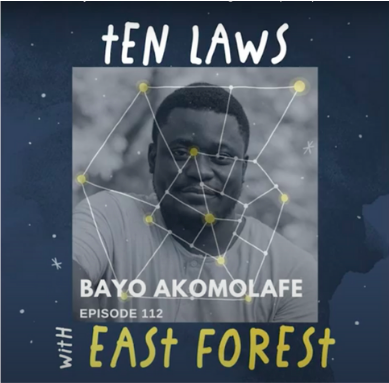 Ten Laws Podcast with East Forest, #112 with Bayo Akomolafe: Uncovering Bones
Ten Laws Podcast with East Forest, #112 with Bayo Akomolafe: Uncovering Bones
https://ten-laws-with-east-forest.simplecast.com/episodes/bayo-akomolafe-uncovering-bones-the-invitation-being-made-112 and where podcasts are available
Bayo Akomolafe is globally recognized for his poetic, unconventional, counterintuitive, and indigenous take on global crisis, civic action, activism and social change. He is an international speaker, poet, and activist for a radical paradigm shift in consciousness and current ways of living. His readings of ‘knowledge’, ‘development’, ‘progress’ and ‘truth’ as Eurocentric metanarratives led him and his wife, Ej to develop the first International Workshop on Alternative Research Paradigms and Indigenous Knowledge Promotion (WARP, 2011). Bayo has authored two books, We Will Tell Our Own Story! and These Wilds Beyond our Fences: Letters to My Daughter on Humanity’s Search for Home.
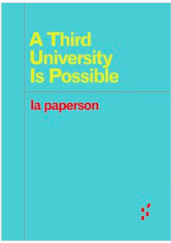 A Third University Is Possible by la paperson
A Third University Is Possible by la paperson
Uncovering the decolonizing ghost in the colonizing machine. Drawing parallels to Third Cinema and Black filmmaking assemblages, A Third University Is Possible ultimately presents new ways of using language to develop a framework for hotwiring university “machines” to the practical work of decolonization.
www.upress.umn.edu/book-division/books/a-third-university-is-possible
_____
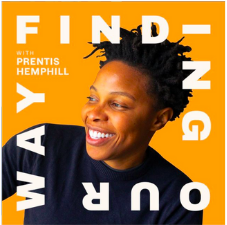 Finding Our Way Podcast, Season 2
Finding Our Way Podcast, Season 2
Finding Our Way is conversation between Prentis and activists, artists and leaders to discuss how to realize the world we want through our own healing and transformation. This isn’t a podcast about answers.
[Image Description: A wider horizontal bar of blue with white text, “617-824-8528. sjc@emerson.edu. Facebook/SocialJusticeCtr. www.emerson.edu/social-justice-center.”]

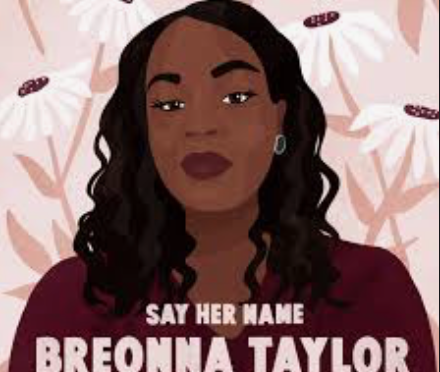
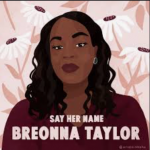 This community update was written before yesterday’s ruling by Attorney General, Daniel Cameron, regarding the indictment of officers involved in the shooting and death of Breonna Taylor. In many ways, the content of much of this newsletter feels out of sync with this moment and what some members of the Emerson Community may be feeling or needing in this moment. Regretfully, there is no measure of consolation that I can offer to sufficiently address the pain that some of us are experiencing today.
This community update was written before yesterday’s ruling by Attorney General, Daniel Cameron, regarding the indictment of officers involved in the shooting and death of Breonna Taylor. In many ways, the content of much of this newsletter feels out of sync with this moment and what some members of the Emerson Community may be feeling or needing in this moment. Regretfully, there is no measure of consolation that I can offer to sufficiently address the pain that some of us are experiencing today. The Panic & Patience Podcast series is hosted by Jae Williams, Director of Special Projects in the Social Justice Center. This series highlights the work of artists, educators, entrepreneurs, athletes, and community leaders as they explore issues affecting marginalized communities, and how we as leaders can create space and support efforts of change. “This is a space where Black and Brown folks can see themselves and their experiences reflected all of their inherit brilliance, fullness, and power,” said Sylvia Spears, Vice President for Equity & Social Justice. This series is anchored in an understanding that this work is an urgent ever-changing process of dismantling social constructs, unconscious bias, and systematic oppression, while also working to build for a future that encourages cultural humility, inclusion, and community growth. Panic & Patience is available on Apple Podcasts, Spotify, and Google Podcasts. Season One is available at Panic & Patience on Youtube. Feel free to check out Jae’s personal Panic & Patience website:
The Panic & Patience Podcast series is hosted by Jae Williams, Director of Special Projects in the Social Justice Center. This series highlights the work of artists, educators, entrepreneurs, athletes, and community leaders as they explore issues affecting marginalized communities, and how we as leaders can create space and support efforts of change. “This is a space where Black and Brown folks can see themselves and their experiences reflected all of their inherit brilliance, fullness, and power,” said Sylvia Spears, Vice President for Equity & Social Justice. This series is anchored in an understanding that this work is an urgent ever-changing process of dismantling social constructs, unconscious bias, and systematic oppression, while also working to build for a future that encourages cultural humility, inclusion, and community growth. Panic & Patience is available on Apple Podcasts, Spotify, and Google Podcasts. Season One is available at Panic & Patience on Youtube. Feel free to check out Jae’s personal Panic & Patience website: 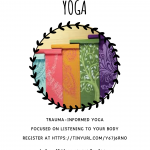 Trauma Informed Yoga
Trauma Informed Yoga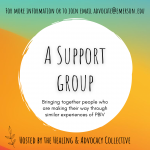 Support Group
Support Group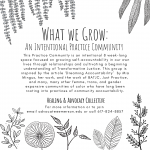 What We Grow: An Intentional Practice Community
What We Grow: An Intentional Practice Community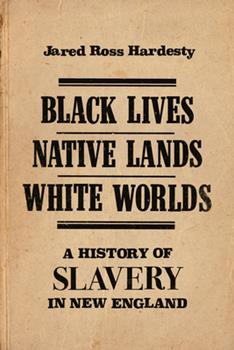 SERIES #
SERIES #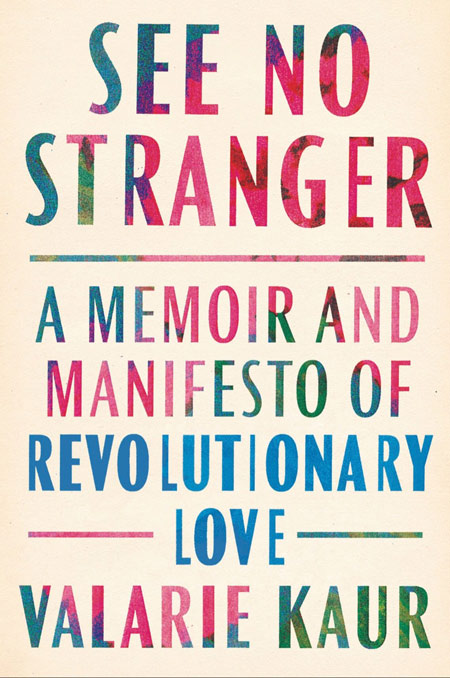
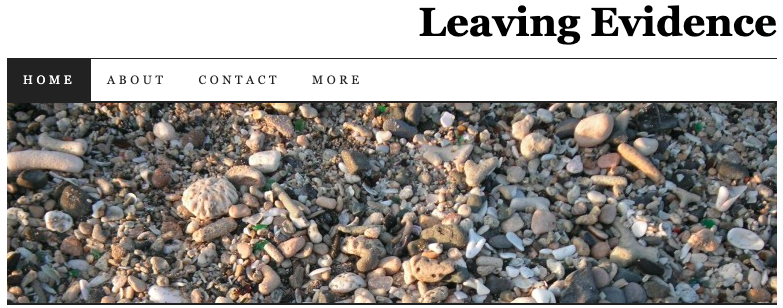 The Four Parts of Accountability: How To Give A Genuine Apology Part
The Four Parts of Accountability: How To Give A Genuine Apology Part 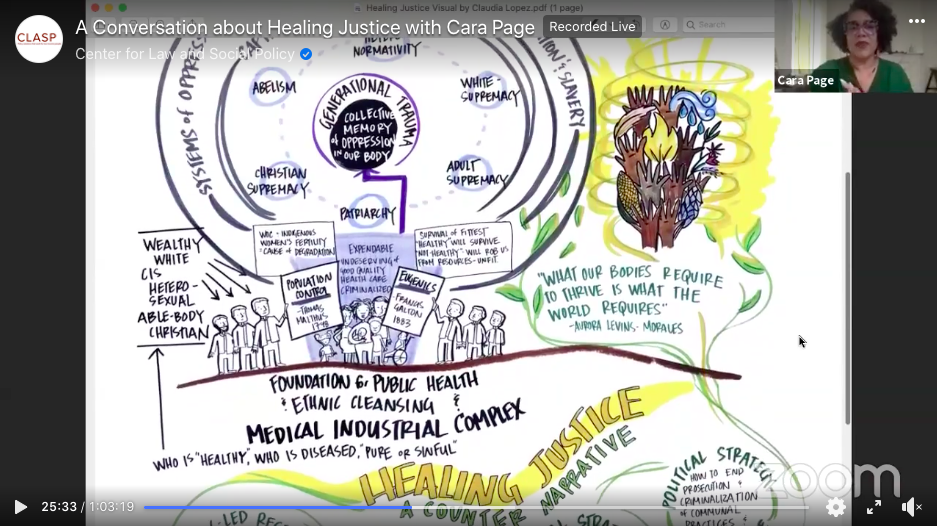 A Conversation About Healing Justice with Cara Page
A Conversation About Healing Justice with Cara Page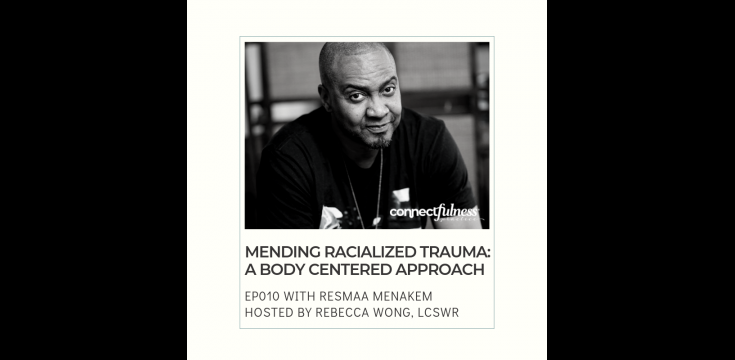 Connectfulness Podcast 010: Mending Racialized Trauma: A Body Centered Approach with Resmaa Menakem
Connectfulness Podcast 010: Mending Racialized Trauma: A Body Centered Approach with Resmaa Menakem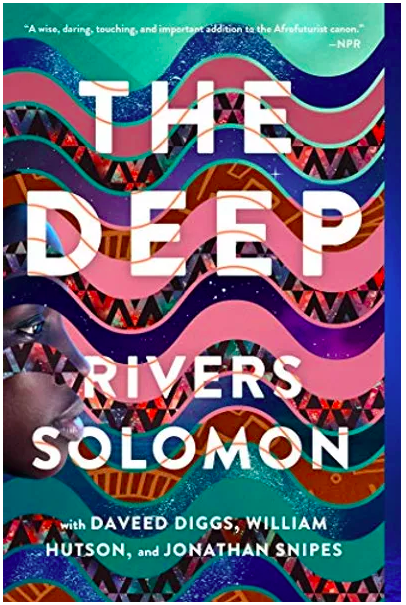 The Deep by Rivers Solomon, with Daveed Diggs, William Hutson, and Jonathan Snipes
The Deep by Rivers Solomon, with Daveed Diggs, William Hutson, and Jonathan Snipes